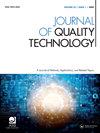为太阳能电池制造过程的质量改进提供知识注入的过程监控
IF 2.2
2区 工程技术
Q2 ENGINEERING, INDUSTRIAL
引用次数: 1
摘要
摘要太阳能转换效率(SCE)是太阳能电池制造过程中重要的质量指标,它与外延阶段基于光电效应的化学气相沉积有关。大量的太阳能电池制造厂在外延阶段仍然缺乏在线过程监控策略,而是在制造完成后使用离线检测。因此,由于离线检查,生产效率降低,下游制造阶段的晶圆质量不确定,因为在单个批次中随机抽样,只能检查一小部分晶圆。本研究提出了一种在太阳能电池制造过程外延阶段的知识注入监测策略,使在线过程监测与质量SCE直接联系起来。提出了一种基于光干涉的定制非线性模型,该模型具有可物理解释且被从业者广泛接受的参数,用于捕获反射信号的关键信息。该非线性模型提取了多个过程特征,并采用一种通用的基于相关性的变量排序方法对sce相关的关键过程特征进行排序。该模型支持在外延阶段对关键特性进行在线过程监控,并允许从业者在出现意外情况时及时采取补救措施。所提出的知识注入过程监测方法充分考虑了光干涉的物理知识和所建立的非线性模型中与质量度量SCE相关的参数的可解释性,便于在外延阶段进行在线过程监测。一个实际的太阳能电池制造案例表明了所提出的监测策略的有效性。本文章由计算机程序翻译,如有差异,请以英文原文为准。
Knowledge-infused process monitoring for quality improvement in solar cell manufacturing processes
Abstract Solar conversion efficiency (SCE), an important quality metric in solar cell manufacturing processes, is related to chemical vapor deposition in the epitaxy stage based on the photoelectric effect. A large number of solar cell fabrication plants still lack online process monitoring strategies at the epitaxy stage and instead use offline inspections after fabrication is completed. Consequently, production efficiency is reduced due to offline inspections and the quality of wafers in downstream manufacturing stages is uncertain because only a small portion of wafers can be inspected due to random sampling within a single batch. A knowledge-infused monitoring strategy in the epitaxy stage of solar cell manufacturing processes that enables the direct link of online process monitoring to quality SCE is proposed in this study. A customized nonlinear model based on light interference with parameters that can be physically interpreted and largely accepted by practitioners is proposed to capture key information of reflectance signals. Multiple process features are extracted and a general correlation-based variable ranking procedure is adopted in this nonlinear model to rank SCE-correlated key process features. This model enables online process monitoring of key features at the epitaxy stage and allows practitioners to apply timely remedies in case of unexpected conditions. The proposed knowledge-infused process monitoring approach fully considers the physical knowledge from light interference and interpretability of parameters in the established nonlinear model correlated with the quality metric SCE to facilitate the online process monitoring at the epitaxy stage. A real solar cell manufacturing case shows the effectiveness of the proposed monitoring strategy.
求助全文
通过发布文献求助,成功后即可免费获取论文全文。
去求助
来源期刊

Journal of Quality Technology
管理科学-工程:工业
CiteScore
5.20
自引率
4.00%
发文量
23
审稿时长
>12 weeks
期刊介绍:
The objective of Journal of Quality Technology is to contribute to the technical advancement of the field of quality technology by publishing papers that emphasize the practical applicability of new techniques, instructive examples of the operation of existing techniques and results of historical researches. Expository, review, and tutorial papers are also acceptable if they are written in a style suitable for practicing engineers.
Sample our Mathematics & Statistics journals, sign in here to start your FREE access for 14 days
 求助内容:
求助内容: 应助结果提醒方式:
应助结果提醒方式:


